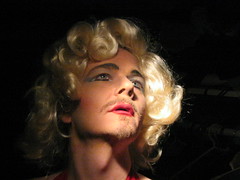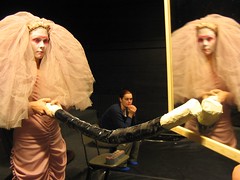If you don't know what the heck I'm talking about, it was a 24/7 performance installation based on the Pasolini film Salò, set in a very large (and exquisitely decorated) house, featuring 33 or so performers, visited by 5000 members of the public, and running for four alternating weeks between January and March 2010. Five types of Characters lived there: Masters, who did whatever the fuck they wanted, Madams, who were responsible for the house and its staff, Fuckers, who were bodyguards with strap-ons down to their knees, Maids, who, predictably, maided, and Children, who were usually the object of the Masters' doing whatever the fuck they wanted. Guests entered, got a membership card, received an introduction from Madam Vaccari (which she must have performed nearly a thousand times and yet it ultimately failed to prepare anybody for the house, it seems—well, with the exception of the final introduction she gave, but that's for later), and were given a coloured ribbon denoting which of the types of character in the house was their host: black for Masters' guests, red for Madams, blue for Fuckers, yellow for Maids, pink for Children.
You would be amazed at how many people think a ribbon can change your personality, or entitle (read: excuse) you to act in a manner that, well, let's say civilised folk might call assholery. You'd be amazed at an awful lot of things people thought and said and did in Villa Salò, and I'm not talking about the performers. To me, it was the audience that was, after a while, the real horrorshow. Maybe that's because I spent so much time in the Villa that I felt my perspective had more in common with the performers than with the guests. But again, more on that later. In fact, the first thing to do is send you elsewhere to read other stuff, like:
Balancing on the edge of the black hole which I now call by the name of Salò, I wonder about the road that took us this far. Never in my decade of publicly mapping the shadowlands of human despair have I known a gaze like the gaze of Salò, this forsaken house which has grown with solemn brooding amongst the kindergardens, the cafés, the unknowing passers-by of snowy, clean Østerbro. This is not the faraway castle of Marquis de Sade´s libertine protagonists, nor is it Pasolini´s desolate palace of Italian war time fascists. This is here and now, and ”the four friends” invite everyone to enter. This is certainly no S&M party, and no funhouse either. Our Salò is no more a sex show than Pasolini´s Salò is a porn film.
-Signa, 15/1 - 2010
If you read Danish or you know Google translate, you'll find no end of commentary and the odd blog post (including goddess of rum balls and burner of kitchen milk herself, Dukken), and of course it ranges from sources who never set foot in the Villa to peeps who were there even more than me (the aforementioned Dukken).
Not about me. Or, well, fuck, it is.
Ooohkay. To be honest, the hardest thing about writing about Signa is not being an asshole oneself, but if there's one thing the piece taught me is that I am as capable as anyone of laughing at misfortune—no, not misfortune, rape—and of acting (or more like not acting, which let's call it passing) in a way that keeps me in favour of whomever I want to be in favour of, even at the expense, humiliation, or torture of someone else, and possibly the worst thing, that I have a great capacity to lord it over other people, particularly when they're asking stupid questions. This is the thing. I really wouldn't like to make this about me. I am not a better or smarter or more compassionate person than others who were at Villa Salò but I have to keep telling myself that. I catch myself being selfish and superior all the time. Only Merry, glorious kitchen bitch that she was, took me down a notch from time to time. "You know, it's not all about you," she said to shut me up once over peeling an endless amount of carrots.
Oh sure, that doesn't sound like much of an admonition. But if you consider that a few hours before that I'd been in the Magistrate's room with the Magistrate, the Bishop and a few other guests when Merry came in to serve sandwiches and, in blatant trespass of the Masters' own rules, they raped her while I held the tray of sandwiches twenty centimetres away from her face and watched, then yeah, she didn't have to say much. In my defense, what else was I supposed to do? If I said stop, they would say "no" and continue. If I intervened physically, I would be subdued or restrained and, depending on my behaviour, allowed to stay or made to leave, and they would continue. If I left the room, the rape would continue. I know this because I saw it all happen again and again and again over days. In fact, any intervention was likely to prolong the torture. But you know that's not a defense, that "what was I supposed to do, I couldn't do anything" line. It is no defense at all. The point is there isn't a defense. Not for people like us, which is to say, people. Of course I feel horrible about not interrupting, of course I do. Or rather I feel horrible about not having been able to fix it. An interruption would have only made it more interesting, but a solution, a way to MAKE IT STOP, that I cannot forgive myself for not having.
And one should not forgive that. Because perhaps, one may hope, out of the realisation that in fact there is no way to stop people with money and power from doing whatever the fuck they want, that out of that realisation and in stupid defiance of it one might try to change things anyway. I find myself, in the days after the Villa, having a very short fuse as regards complacency. For ages I had accepted that CEOs would do what they liked but that really they were just people and in their situation anyone would act like that. Now I feel like a seventeen-year-old again with an oversized "fuck you I won't do what they told me" gland and no mercy whatsoever for the greedy. And, well, fuck this sounds dumb but. Haven't you ever wanted to feel like you did when you were young and and the world was completely unacceptable? Aren't you sick of the compromises you've made and the ones in others that you have let slide because fuck it, who cares, integrity is for people who don't have decisions to make? It's maybe a side-order to what Signa's intentions were, but I could never pay them back for the gift of uncompromising anger, I don't care if it only lasts a week.
Nothing to see here folks
Oh and by the way, it's theatrical, yes, by which I mean representational. Which means that Merry was never raped, not in a legal sense. That when Tonino nearly made me puke on the first day when I witnessed him being forced to eat shit, he was acting. When Bernadetta was deflowered by seven men, one right after the other, there was no real penetration. When Franchino got electric shocks on his balls, the it looked worse than it actually was. Actually, I'd need to ask Max Pross about that one, because it looked pretty bad. All of the miseries were acted exquisitely. It took me days to figure out what was "real" and what was not, and I'm left with more than a few uncertainties. I still wonder where the blood capsules are hidden, how they made the shit smell so fantastically shitty, where the hell they hid their real genitalia half of the time, or exactly how they managed to soften the whipping and slaps while making them look terrifically painful. Of course there are some marks and bruises. And I'm willing to bet a house on the claim that not a single one of those performers will ever be the same again. I doubt that any of them, however, if they had to choose again, would choose not to do Salò.
But the point is it was acted so fucking well that many guests mistook something representational for the real thing, which honestly says an awful lot about what people think about artists in general and Signa in particular. They're not torturing the performers, people. There's no need to risk STDs and infection and health in general any more than is required for such a show—the piece risks wonking the artists' view of the human race forever and that's quite enough risk already thank you. There is control, there is communication, and there is a fuckload of trust. After many days' observation, it was possible to see when things were whispered, or when the Children were fighting not to crack a smile at sadistic yet often hilarious dialogue outlining what was going to be done to them in the immediate future. I even saw it in the Duke, one of the most fearsome bastards known to man, woman, or child. And so but the next time someone (probably in performance art) tells me that representation is dead and presentation is the only way to make art... well.
And but so the thing is I have pages to write before I sleep, but this is at least a start.

